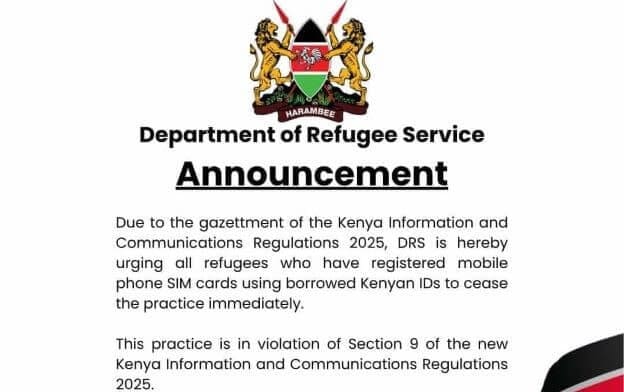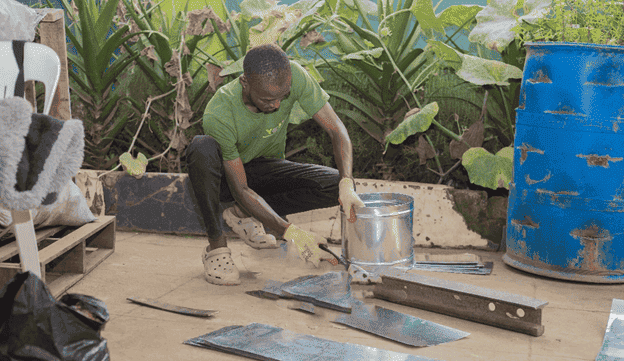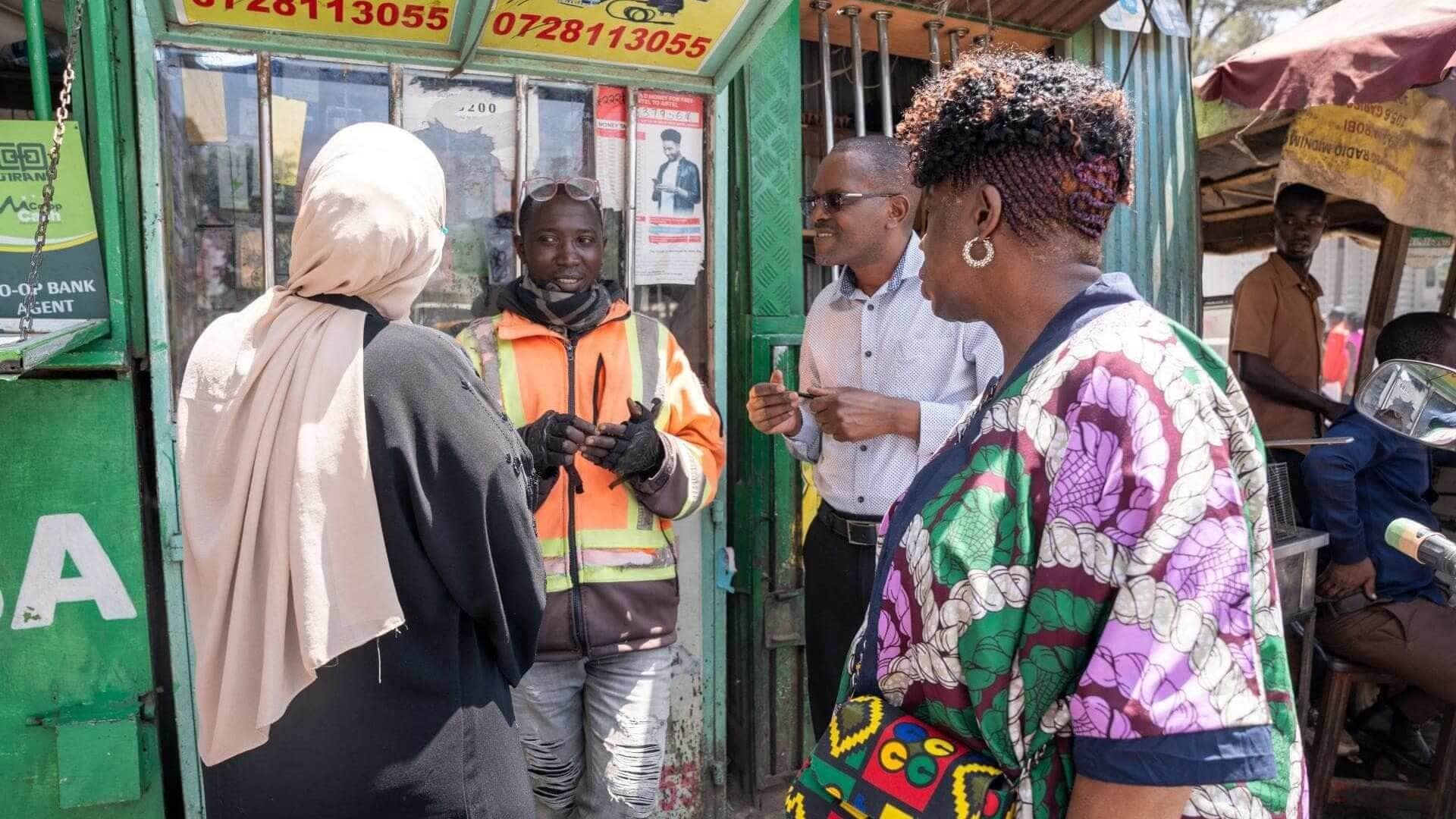Bridging Research and Policy: Enhancing Refugee Livelihoods in East Africa
Bridging Research and Policy: Enhancing Refugee Livelihoods in East Africa
Bridging Research and Policy: Enhancing Refugee Livelihoods in East Africa
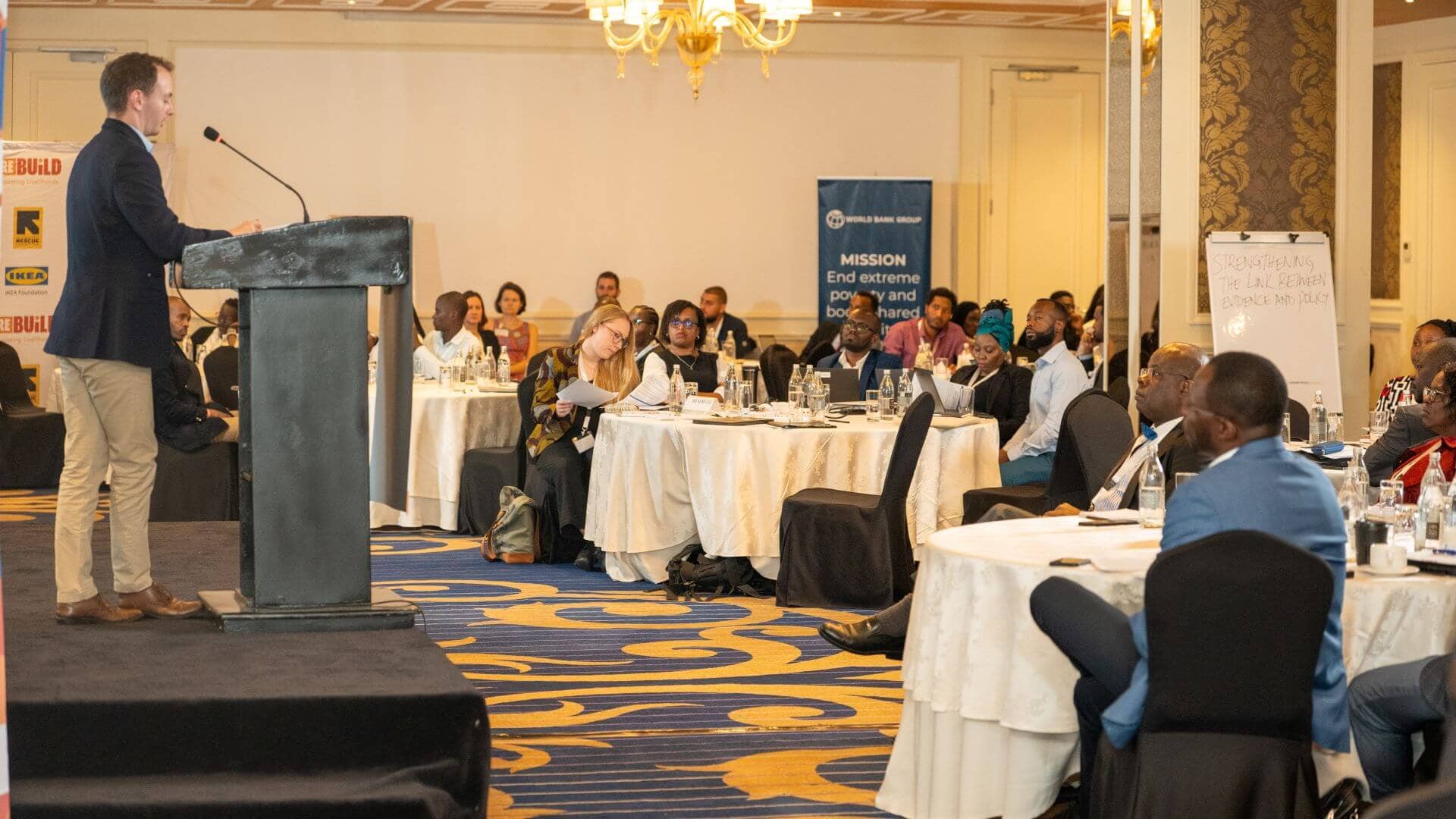
Mirko Vintar, Consultant, World Bank’s Poverty and Equity Global Practice making a presentation during the Research and Policy Symposium on October 15, 2024. The symposium was convened by the IRC's ReBUiLD, the IKEA Foundation and the World Bank. (PHOTO: Edgar Otieno/TheIRC)
The International Rescue Committee’s Re:BUiLD Program, the IKEA Foundation, and the World Bank, in partnership with United Nations High Commissioner for Refugees, International Labour Organization, Refugees and Returnees Services – Government of Ethiopia, Department of Refugee Services – Government of Kenya, Office of the Prime Minister Uganda, Kampala Capital City Authority, Nairobi City County Government and Refugee-led Research Hub, convened a high-level research and policy symposium in Nairobi, Kenya where policymakers, researchers, donors, I(NGO), private sector practitioners, and refugees from Kenya, Uganda, and Ethiopia discussed research informing policies to support the livelihoods of displaced persons in urban areas of the East and Horn of Africa.
The two-day event that took place from October 15 to 16, 2024, attracted more than 1,000 people who attended in person and virtually.
According to UNHCR, as of September 2024, the East, Horn of Africa, and the Great Lakes region host about 5.5 million refugees. Climate change, along with protracted crises and conflicts, have acutely disrupted the livelihoods of vulnerable refugees and host communities in the region. At the symposium, Banchiamlack Dessalegn, the IRC’s Regional Vice President for East Africa, called for evidence-based interaction and commitment among policymakers to formulate policies that enhance the lives and livelihoods of displaced populations and host communities.
A common concern among practitioners and researchers is ensuring that research-based evidence informs policies, especially for refugees and vulnerable hosts in urban areas. Priscilla Dembetembe, Program Director for Re:BUiLD, - set the tone for the symposium with the question: “As development partners and researchers, we produce a wealth of research, but does it ultimately reach the desks of policymakers?”
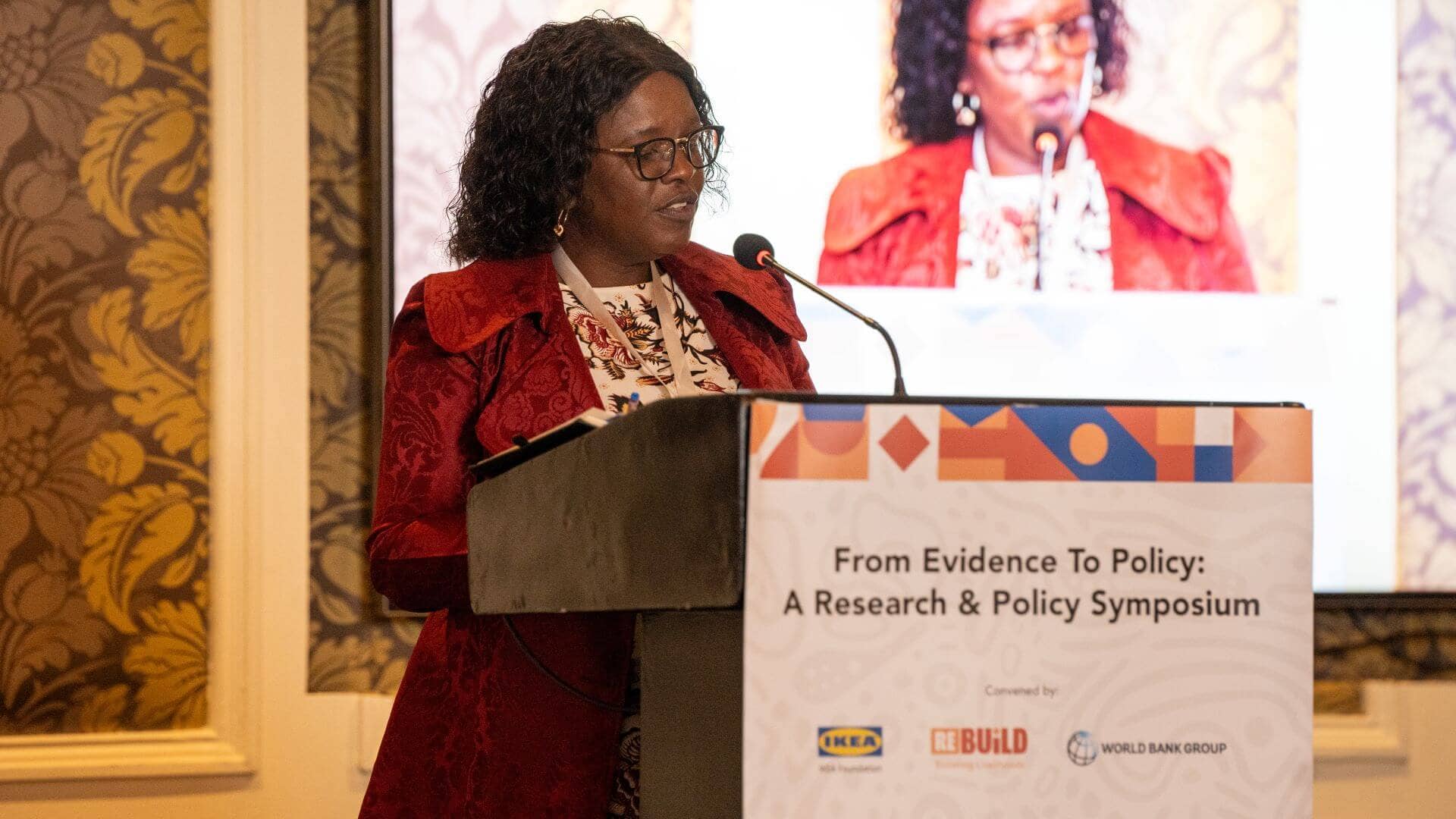
16th October, 2024 - Nairobi, Kenya. Priscilla Dembetembe, The International Rescue Committee’s Re:BUiLD Program Director making a speech at the Research and Policy Symposium held at Villa Rosa Kempinski, Nairobi. (PHOTO: Edgar Otieno/TheIRC)
Researchers presented findings that could inform future policies to improve economic outcomes and social cohesion among vulnerable refugees and host communities. For instance, in Uganda, BMJ Global Health’ study on targeted cash transfers to refugee households during Covid-19 found that the cash was a significant factor in mitigating against food security declines and mental well-being of the refugees during shocks. In Kenya, Inkomoko’s study on Access to Finance & Microenterprises supports scaling refugee-owned micro and small enterprises. Meanwhile, in Ethiopia, the German Institute of Development and Sustainability (IDOS) found that refugees with vocational skills are mostly employed in the informal sector, which often lacks decent work conditions.
The symposium also highlighted the importance of including refugees in the research and policymaking process. Rediet Kassaye, Program Manager for the Refugee Livelihoods portfolio at the IKEA Foundation, stated: “As institutions working on displacement and with refugees, we must ensure inclusion of voices of those with lived experience in research and policy-making.” He emphasized that refugees should be “not only a subject of research but owners of their stories,” and that engaging them in designing and implementing research and policies ensures they are part of the change.
Mohamed Hassan, a refugee researcher from the Refugee-Led Research Hub, described refugee participation and meaningful inclusion in refugee programming as a moral question – noting that for the past 30 years, the systems that have been built have not included refugees in a meaningful way something that he noted is time for it to change. “Education programing is producing a lot of educated refugees, but are livelihoods programs planned for these educated refugees? There is a need to confront the systems that has been built over the decades which excludes refugees,” Hassan pointed out.
Patrick Okello, the Commissioner for Refugees Management in Uganda, emphasized the need for policies based on high-quality research, critical analysis, and informed debate to improve refugee livelihoods. He stated, “Current policies must be grounded in research and tailored to address the challenges faced by refugees effectively. Our goal is to bridge the gap between research and policy and facilitate the implementation of effective, evidence-based strategies.”
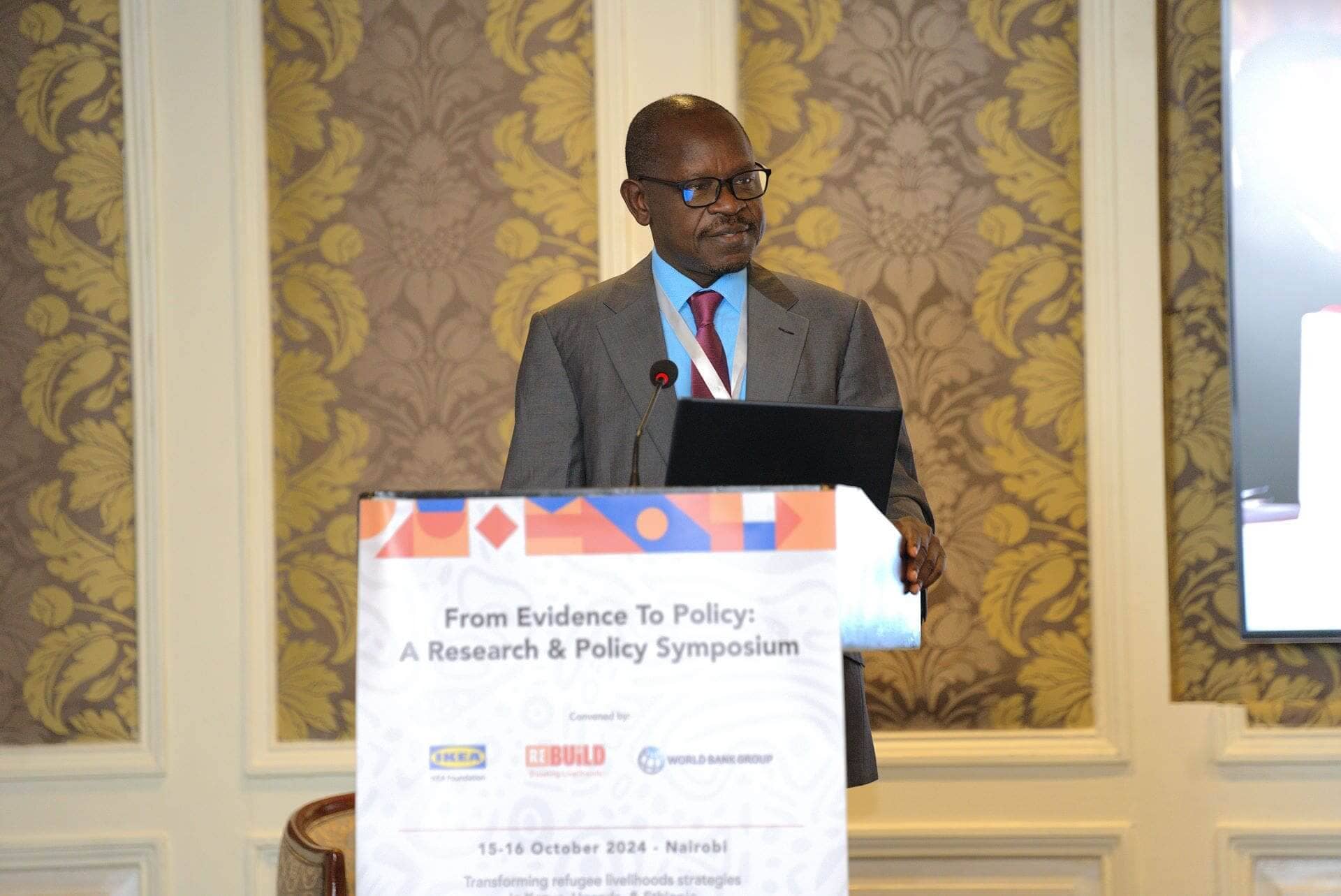
16th October, 2024 - Nairobi, Kenya. Patrick Okello, the Commissioner for Refugees Management in Uganda making a speech at the Research and Policy Symposium held at Villa Rosa Kempinski, Nairobi. (PHOTO: Edgar Otieno/TheIRC)
Miguel de Corral, Senior Operations Officer at the World Bank’s fragility, conflict, and violence group, supported this view. He shared that, “Addressing the needs of refugees and host communities demands collective action from both humanitarian and development actors, grounded in crucial analytical work by researchers.”
Calling for inclusive and transformative research, Jashon Awor – Deputy Commissioner Department of Refugee Services, Government of Kenya, said: “The Department of Refugee Services has observed that research can serve as a beacon that illuminates a path to effective policy or regrettably as an exercise detached from the very realities that it seeks to address,” adding that for research to catalyze real change, it must therefore be deeply rooted in inclusivity and with an understanding of the local context and involve every stakeholder while carrying out the studies.
Melle Van-Hilten, the country representative for IMPACT Initiatives in Uganda, highlighted the need for more research on the impact of migration on livelihoods. He noted, “Refugees tend to be very mobile, either within the country or the region, driven by various factors including economic reasons. It is crucial to understand this movement and its impact on the programs we implement and their potential outcomes.”
Noting how his government is spearheading refugee self-reliance Anteneh Mekasha, the Livelihood and Job Creation Team Leader at the Refugees and Returnees Services, Government of Ethiopia, said: "Our focus is on strengthening refugee self-reliance and integrating them into Ethiopia's labor market, enabling their participation in employment pathways through close coordination and cooperation."
Notable takeaways from the symposium included: the need for institutions to improve and develop capacity to manage refugees, need to develop context specific interventions and to support platforms like the research and policy symposium to share knowledge, among others.
The Re:BUiLD Program team expressed commitment to follow up on the actions that it can take forward when it convenes a second symposium in 2025/2026.
